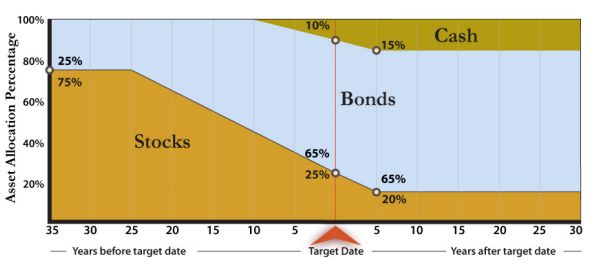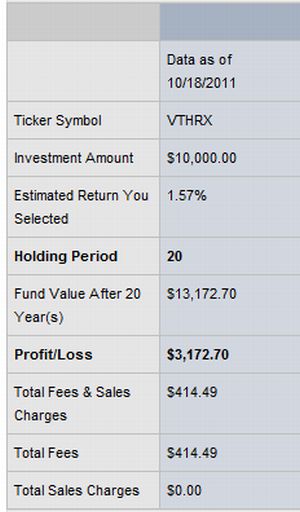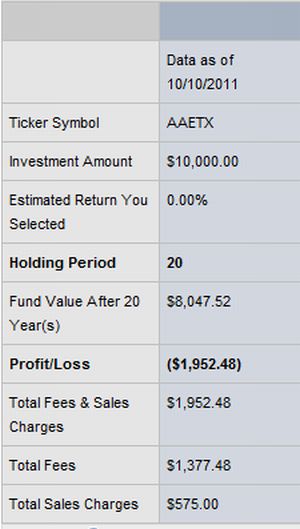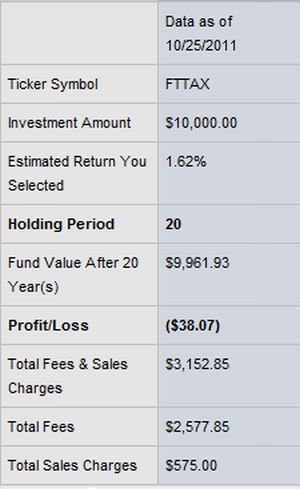Target Date Retirement Funds: How Do They Stack Up
Recently, I’ve been planning to start new Roth IRA account, since I’m not happy with my current Roth IRAs funds performance. As a result I’ve been on the search for a more reliable place to invest. This lead me to an investment I’ve hearing a lot of people talk about lately called target date funds, and in this article I’m going to show you just exactly what they are and how they stack up.
What Are Target Date Mutual Funds
To start target date are just what they say they are, they are set up so they will conform to the time at which you plan to retire. For example, if you were to go with the 2040 Vanguard Target Date Fund, it would mean that you are planning to retire in the year of 2040.
On top of that as you get closer and closer to your retirement date the fund will automatically become more and more conservative until you retire at which time the account will move into a preservative investment strategy were it will take on the least amount of risk as possible but still work to earn a small return. Below is a chart that shows how this process will take place.
In the chart above it shows that in the beginning you will have nearly 75% of your money invested in stocks while 25% of your portfolio will be invested bonds, and once you hit your target retirement date you will have only 25% in stocks, 65% in bonds, and the last 10% will be held in cash.
As you can see the great thing about these funds is that it gives you that carefree mentality that you don’t have to continually monitor your investments. For example, my current retirement plan at my work place has me invested in a moderate aggressive fund. However if I wanted to move to a conservative fund I would have to do it manually. With a target date retirement funds you wouldn’t have to worry about this because it would be done automatically.
How Do Target Date Funds Stack Up
Now that we know what target date mutual funds are let’s see how they stack up overall. To do this we are going to look at fees, and returns of three prominent companies funds, Vanguard, American Funds, and Franklin Templeton, and see what is the best target date retirement funds.
Vanguard 2030Target Date Mutual Fund
Returns Since Inception: 1.57%
Fees: 0% Sales Charge and a 0.18% Annual Expense Fee
How It Stacks Up: The up side to this fund is that it carries a very low fee which is what Vanguard is well know for. In fact this fund only charges at total of $414 in fees over the 20 year period which is incredibly low. However when we consider the returns of the fund we can see they are not very promising.
In fact if you look at the chart above you can see that if the fund were to earn the same rate of return over the next 20 years it would only bring in a total profit of $3,172. This isn’t very promising for someone to retire on.
However you may not want to to discount this fund since it’s currently only been around for 5+ years and may see some increases in returns over time.
American Funds 2030 Target Date Retirement Fund
Returns Since Inception: -1.20%
Fees: 5.75% Sales Charge and a 0.79% Annual Expense Fee
How Does It Stack Up: The 2030 target date fund from American Funds does not seem to stack up all that great, with a -1.20% loss since it started. However we also need to consider the fact that this fund is not even 5 years old.
On top of that the fees are are a bit on the extreme side with a large sales charge fee. On the other hand the annual expense fee is fairly low. However over time I expect this fund to improve.
Franklin Templeton 2035 Retirement Target Fund
Returns Since Inception: 1.62%
Fees: 5.75% Sales Charge and an Annual Expense Fee of 1.33%
How The Fund Stacks Up: With the Franklin Templeton 2035 target date retirement fund we can see that the fees are fairly steep. With a 5.75% sales charge and a 1.33% annual operating expense fee we would need at least a 2% return to break even. In fact with a current return of 1.62% we would still lose money after 20 years.
Final Thoughts…
As you can see my research has brought up a few interesting points you should note. First off, when we look at returns for target date funds notice that the returns only range from as high as 2% to as low as a -2%. Not very encouraging for retirement investment.
Secondly, consider the fees. For the exception of the Vanguard fund, the fees with American Funds and Franklin Templeton seem to be extremely high. The reason I’m pointing this out is because with a higher annual expense fees we could assume that they would have more working capital to make better investment choices but this is clearly not the case.
Finally, take note as to how long these funds have been around. Two of the funds have only been around for 5+ years and the second not even that long. These funds may gain higher returns over the long run but only time will tell.
So before you invest with your money with target date retirement funds take the time to do your homework first and see what kind of fees they are charging and what kind of returns they have currently achieved since they’ve started.
So what are your thoughts about target date mutual funds? Are they worth it? Is their one you prefer and invest with? Feel free to share your thoughts, comments, and questions below.
This post was recently featured in The Carnival of Personal Finance by Sustainable Personal Finance.











Great analysis. I never believed in target date retirement funds. Finding other great mutual funds like American funds is much a better option.
And to think I almost invested in one. Thanks for the comment.